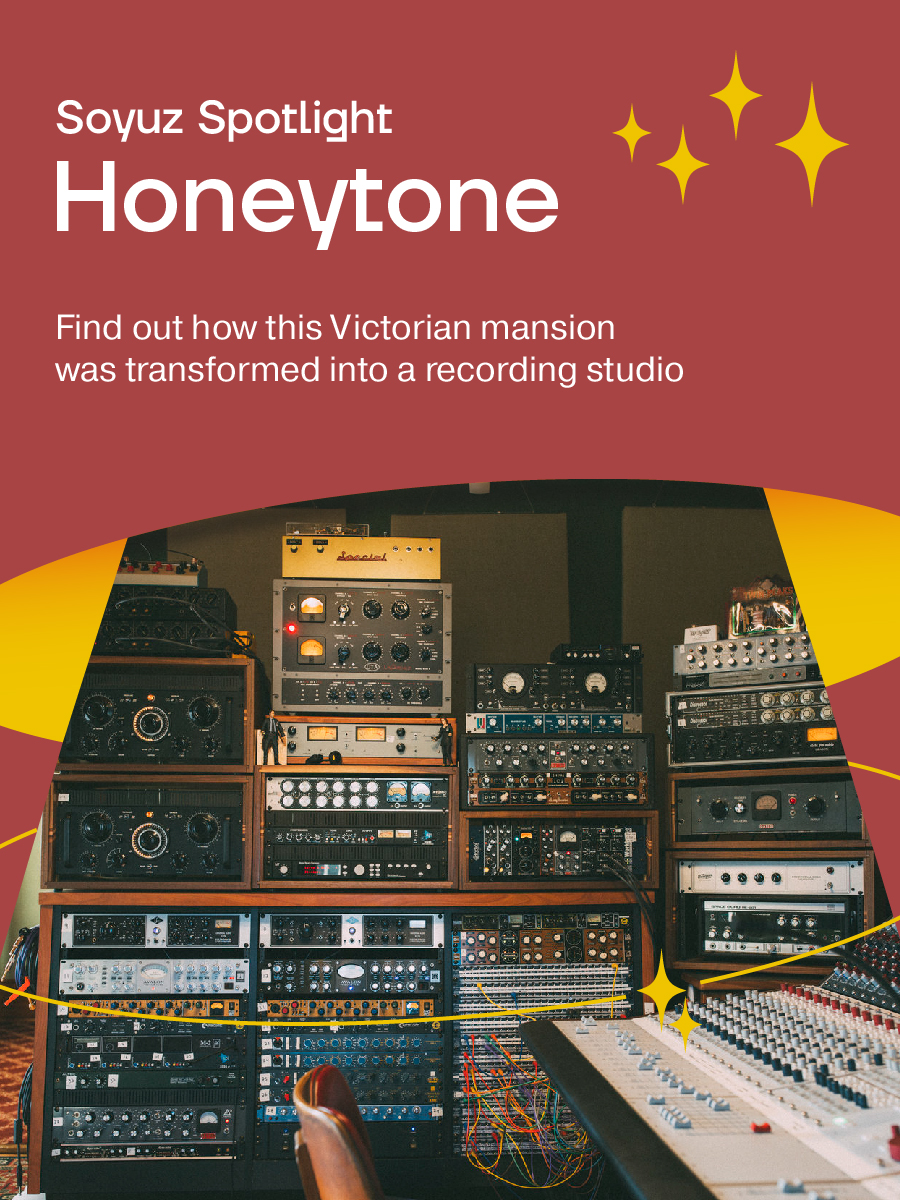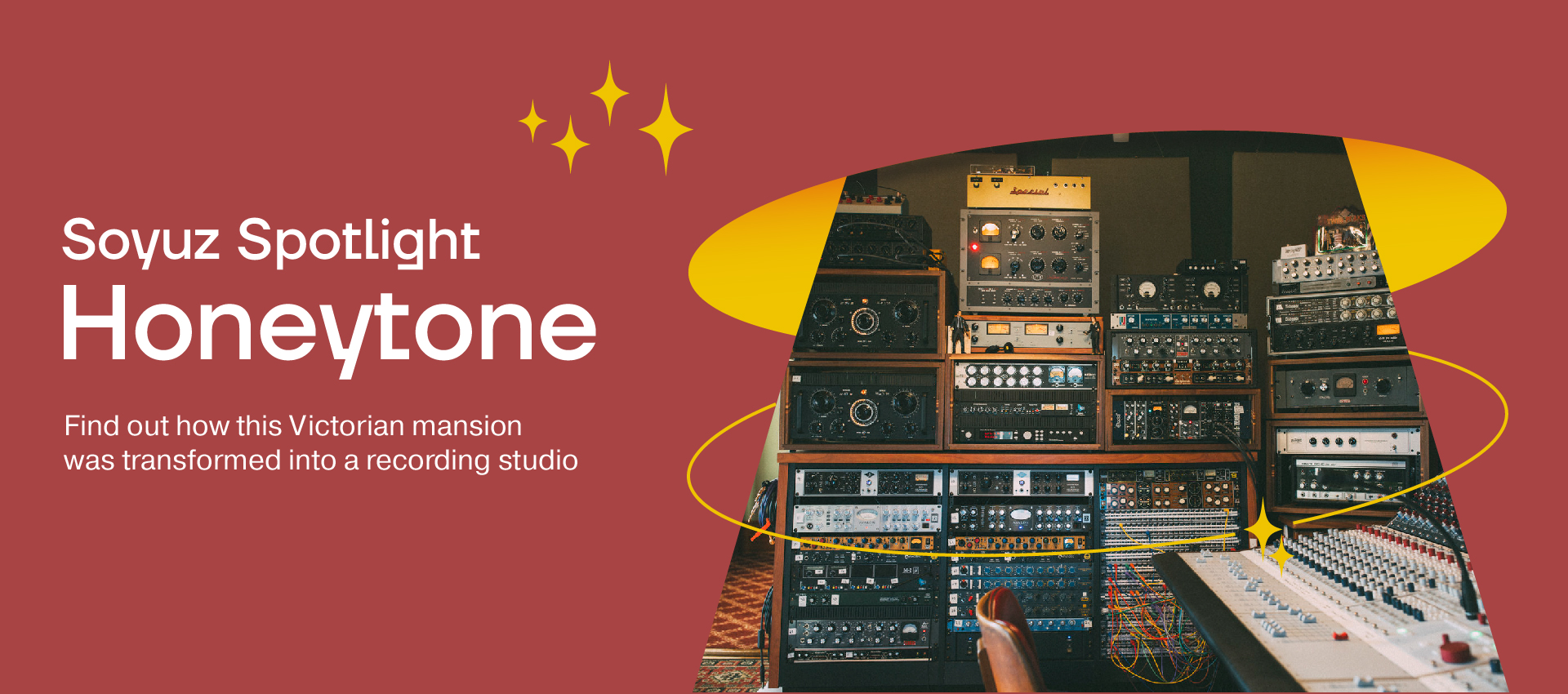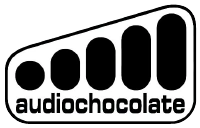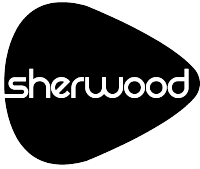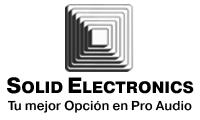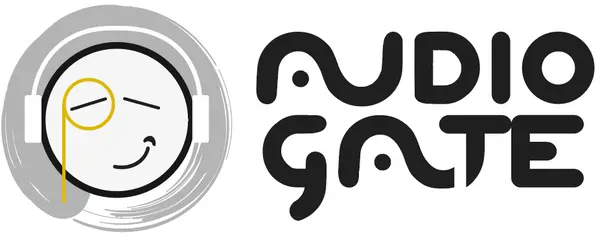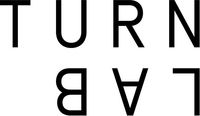Even through Zoom, you can see the glow in De’Anza’s eyes when she begins to talk about her travels. The singer, songwriter and beatmaker was born and bred in New Mexico, headed to Los Angeles, and ultimately decided that a nomadic lifestyle was right for her.
“I lived in Los Angeles for 16 years and it was a great experience, but I got to the point where I just wanted something else,” says De’Anza. “So I downsized and sold most everything I owned and went to the Riviera Maya in Mexico. When you travel, your awareness is heightened and, personally, I feel like that is more important for my creative process than having a studio full of gear.”
Traveling and making music on the go have become one in the same for De’Anza. In the latest installment of our Creative Like Clockwork series, she further elaborates on her creative process, blending traditional and modern music, and the importance of finding inspiration wherever you may find yourself.
What does the word “create” mean to you?
Create means to turn nothing into something. To me, creation is all around us.
Before you start to create like actually making a beat or a song, what do you need to do to get yourself ready?
It depends on what I’m creating. If I’m making a beat, I’m going to go to a coffee shop, go to a restaurant or maybe a bar, and I’ve got my little portable system that I can use to create there. Being around people helps, even if I’m not talking to them, because I think there is part of a songwriter or creator that can be real solitary.
If I’m songwriting, that’s where more of the ritual comes in. I’m lighting some palo santo or copal, these incense we use traditionally in Latin America. I’m lighting copal, turning off the lights, lighting candles, getting it real dark and getting introspective. A lot of times, I’ll meditate, try to focus my energy, and then I’ll write.
When you’re in that pre-creation mode, what dictates what you’re going to be working on?
Life. Life inspires me. A few weeks ago I went to this amazing underground dancehall/reggae club where I mostly live in Playa Del Carmen, Mexico. They were spinning some 90s, amazing dancehall tracks. So the next morning that inspired me, and I’m listening to dancehall all day and I want to make something in that vein. Or if I’m hearing a lot of cumbia, which is what I love about living in Mexico, there’s so much in the streets. So if I’m hearing the cumbias in the taxis or I’m walking by and I’m hearing this music and I’m like, “That’s cool, I’m going to sample that and incorporate that.” If I’m hanging out on the beach a lot, I’m going to make a tropical track. Everything in my environment inspires me.
When you get to the point of starting to create, do you always start the same way with some presets in your DAW or the same guitar? Or do you try and do something different each time?
It’s different. I’ll try different avenues of creating. Sometimes, it’ll be something very specific. I have this Zoom recorder that I take around with me and record a lot of street sounds. That might be my idea for the day and I’ll go through my recordings and “Oh that’s a cool sound, let me make a song around that.”
Or I just might turn on my interface, turn off the lights, light some candles and just sing with no instrument, maybe the instrument is confining, so I’ll just use my voice. I play guitar and piano, so maybe I’ll just sit down with a guitar and play a progression or maybe it’s more beat-driven.
I always have these different elements of creating. Beats are cool, it’s going to give a different inspiration, a different flow, as opposed to just an acapella voice where I’m freer with the melody cause I don’t have a beat or harmony to restrict me. There are a lot of different avenues.
When does actually putting something down in your DAW come into play?
If I’m at home, my gear is already all set up. I’m really a minimalist because I travel so much. I can’t carry a lot, so my Apollo, my Satellite, that’s always set up. But, if I’m making beats or doing tedious editing work, I might go out and work at a cafe or a restaurant or whatever, just to be around people. In that case, I’m not going to have my interface, so I’ve got a tiny little MIDI controller. It helps to change the environment, otherwise, things get stagnant and I get bored.
Talk a little more in-depth about your recording set-up.
It’s pretty minimalist. I have an Apollo Twin DUO and Satellite OCTO, Strat, Kemper Stage, a portable MIDI keyboard that I can travel with that fits into my luggage, iLoud Micro Monitors because they are small and can also travel in my luggage and I have my Soyuz 013 FET microphone. That’s really all I need and everything else is in the box.
How did you come to find Soyuz Microphones?
I was looking for a microphone that I could easily travel with for my mobile rig. Traveling on a plane with a heavy fragile tube microphone was definitely out of the question. I asked my friend Carlos “El Loco” Bedoya who is a phenomenal engineer and has worked with some of the top names in the industry. He has access to a lot of microphones and if he was recommending it so highly I knew it had to be good.
What do you like about the 013 and how do you use it for recording?
Right now I use it mostly for vocals but there isn’t a source that it doesn’t sound good on. It brings a beautiful clarity to my voice that I really enjoy. As a singer, it’s important for me to have a microphone that’s “fun” to sing through. The Shure SM7B is incredibly popular and would have worked for my traveling needs but personally it doesn’t bring that life and excitement to my voice that I hear when I sing into the Soyuz 013 FET.
How has your current creative process come together over the years?
It’s just that, it’s a process. I think one of the most important things is just showing up. As long as I’m showing up and working on something each day, whether it be beat-making or songwriting, I’m always going to find different and better ways to create.
Right now, I’m finding lots of ways to work faster, but that might not have come if I hadn’t tried something another way. It’s this constant progress and learning from other people, asking other creative friends and getting tips and finding the right flow. I think for most creatives, it’s always changing and you’re trying to get better, always trying to improve your process.
What’s the best tip you’ve gotten while talking with other creatives about how they work?
Recently, the thing that has been most beneficial to me is learning to improvise melodies. So I’ll make a beat and it’s like “I guess it’s time to write the chorus,” and there’s so much pressure. The chorus needs to be the hook, it’s gotta be so good. So the next thing you know it’s been three weeks, this chorus is killing me and you just get into that place where you feel like you’re hitting a wall, but you’re still showing up. I’m really good at showing up, even if it’s driving me crazy and making sure I’m putting in the work.
“Just improvise.” Take five passes at the song and just don’t think. I think a lot of times we get in our own way. If I’m not thinking “Oh I gotta write the chorus,” if I’m just singing and creating melodies without “Oh that was good” or “Oh that sucks,” without that judgment and I’m just doing it then things start to open up and it’s a much more fun process. So maybe improvising five passes, and then maybe improvising five more, listening to the melody and finding the chorus. It’s trying to tap into that unconscious.
How do you fight option paralysis and avoid getting too stuck on making sounds?
Like a lot of producers, I have so much software, I really just try to learn one. So I’ll be like, “I’m going to play with this delay for the next two weeks and really learn it.” So when I’m creating a track, I’m going to play with that delay, instead of “Oh, I have this one, oh I have that one.” And then the next thing you know I’ve been working on just the delay for four hours when I could have been doing something more productive.
I think having limitations is important and knowing what tools you like and using those tools and being a minimalist in that sense. At the end of the day, what’s most important is the song. Is the song good? Nobody besides other musicians or producers cares what vintage delay or what this did. What they care about is the song. I’m a minimalist in life in general because I think limitations can make you spend your time more wisely and on the things that matter.
Traditional and modern music both play a huge factor in your art. How do you bring those together in an organic way?
It’s how I grew up and who I am. I’m from Santa Fe, New Mexico. My grandmother was Mexican and the border crossed the rest of my family. With my grandmother, I grew up with mariachi, ranchero and folklore music while also absorbing the Mexican from her. My mother listened to a lot of pop like Janet Jackson and Madonna and rock like Led Zeppelin, while my dad was huge on soul music and Motown. For me, it was natural to mix Latin Folklore with modern musical elements because it’s what I grew up listening to.
Is there any method to balancing those influences when you’re creating?
Not particularly. Again, I think for the most part it comes naturally. I try to stay in the loop about new music that’s coming out and listening to sounds and production techniques other producers are using. So if I am working on a cumbia song I’m definitely going to incorporate modern production and sounds into it.
If someone came to you and said they are stuck musically, what advice would you give to them to try and break through writer’s block?
One of the most important things is to just show up, even when you are having ruts, and to understand that it’s normal. I think a lot of times, it happens to people and they say, “Oh this is too hard,” and they quit. But you can’t quit and you have to just keep showing up. It’s a part of it.
It’s why there is that stereotype of the frustrated artist, we’re trying to look within ourselves and that’s incredibly difficult. When you put in the work, you’ll find that life naturally kind of gets you out of that rut and you’ll open up if you just keep coming back to it.
What does leading a nomadic lifestyle mean for your musical creations?
Music is everywhere, it’s the textures and energy that’s in the streets or the calmness in mother nature. If you’re in New York, that’s a different sound than in LA. If you’re in Oaxaca, Mexico, that’s a much different folklore sound than the Riviera Maya which is more jungle and tropical. So traveling has helped open me up in that sense, where I can go somewhere, experience that place and take that and create some sonics to it. It’s like a soundtrack to my travels and life.

